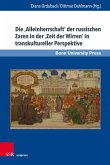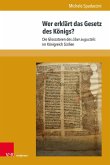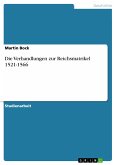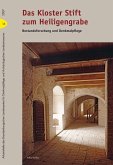The history of Quedlinburg's imperial convent was determined by the interdependency of varying conceptions and systemic conditions over the course of time . The foundation is exemplarily portrayed as a social system consisting of eight components and the fact that the convent survived the changing circumstances for nine hundred years was a result of this systemic structure. The convent established 'female rule' as a special type of government system. The burghers of the city adopted ideas from central Germany's cultural regions and the imperial convent transformed into a cultural small state in its own right. Prussia's power politics in the 18th century, the rise of the bourgeoisie and the shortcomings of the last abbesses led ultimately to the loss of imperial immediacy and to the closure of the by then secularised convent. The crisis in and the decline of the Holy Roman Empire, in comparison, played only a minor role.
Dieser Download kann aus rechtlichen Gründen nur mit Rechnungsadresse in A, B, BG, CY, CZ, D, DK, EW, E, FIN, F, GR, H, IRL, I, LT, L, LR, M, NL, PL, P, R, S, SLO, SK ausgeliefert werden.









